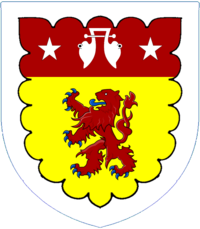David Maxwell Fyfe, 1st Earl of Kilmuir
David Patrick Maxwell Fyfe, 1st Earl of Kilmuir, GCVO, PC (29 May 1900 – 27 January 1967), known as Sir David Maxwell Fyfe from 1942 to 1954 and as Viscount Kilmuir from 1954 to 1962, was a British Conservative politician, lawyer and judge who combined an industrious and precocious legal career with political ambitions that took him to the offices of Solicitor General, Attorney General, Home Secretary and Lord High Chancellor of Great Britain.As Home Secretary from 1951 to 1954 he greatly increased the number of prosecutions of homosexuals in the UK, and declined to commute Derek Bentley's death sentence for the murder of a police officer.[2] After graduation, he worked for the British Commonwealth Union as political secretary to Sir Patrick Hannon MP, studying law in his spare time.[3] Maxwell Fyfe later wrote that his ambition was to be a silk (King's Counsel) in his thirties, a minister in his forties and at the top of the legal profession in his fifties.[3] Maxwell Fyfe, along with Patrick Spens, Derrick Gunston and others, backed the National Government over the Hoare–Laval Pact, and he supported Neville Chamberlain over the Munich Agreement.However, after the German occupation of Czechoslovakia in March 1939, Maxwell Fyfe joined the Territorial Army[6] and, at the outbreak of World War II in September, he was deployed to the Judge Advocate-General's department with rank of major.He applied himself to his work in the wartime coalition government with enormous industry and began some of the thinking and planning about how the leaders of the Nazi regime in Germany might be brought to account after the war.As part of his duties, on 8 April 1945, he attended an Anglo-American discussion over the war crimes trial, at which, says the historian Richard Overy, "he presented the standard British argument for summary execution.[3] After Nuremberg, Maxwell Fyfe returned to Parliament to shadow the Minister of Labour while simultaneously pursuing a full, busy and prominent career at the Bar, for example defending serial murderer John George Haigh in 1949.[3] Shortly before the United Kingdom general election of 1951, Maxwell Fyfe caused a stir when he appeared to hint in a radio interview that a Conservative government might legislate to curb the power of trade unions.[3] Maxwell Fyfe remained ambitious and a Daily Mirror opinion poll in 1954, on the popular favourite to succeed Churchill as Party leader and prime minister, had him behind Eden and Butler but well ahead of Macmillan.[3] In his memoirs (Political Adventure, p233) he later wrote that he had hoped to emerge as a compromise leader like Bonar Law in 1911 if Eden and Butler, both of whom he regarded as personal friends, found themselves in a dead heat.[3] Kilmuir was a formidable parliamentary presence on behalf of his party, and his remarkable memory compensated for a dull speaking style, though he was capable of passion when the circumstances were right.In appearance, "His body was pear-shaped, and beneath a large square bald head there were dark heavy eyebrows and a face of middle-eastern pallor and swarthiness".


The Right HonourableNurembergLaura KnightLord ChancellorElizabeth IIWinston ChurchillAnthony EdenHarold MacmillanThe Viscount SimondsThe Lord DilhorneHome SecretaryJames Chuter EdeGwilym Lloyd GeorgeAttorney-General for EnglandSir Donald SomervellHartley ShawcrossSolicitor-General for EnglandSir William JowittWalter MoncktonEdinburghWithyhamConservativeSylvia HarrisonAlma materBalliol College, OxfordBritish ConservativeSolicitor GeneralAttorney GeneralLord High Chancellor of Great Britainprosecuting counselsNuremberg TrialsEuropean Convention on Human RightsDerek Bentleycabinet reshuffleGeorge Watson's CollegeGreatsStubbs SocietyScots GuardsWorld War IBritish Commonwealth UnionPatrick HannonGray's Inncalled to the barGeorge LynskeySpen ValleyLiberalMember of ParliamentJohn SimonSimon CommissionParliamentLiverpool West Derbyby-electionKing's CounselRecorderOldhamPatrick SpensDerrick GunstonNational GovernmentHoare–Laval PactNeville ChamberlainMunich AgreementGerman occupation of CzechoslovakiaTerritorial ArmyWorld War IIJudge Advocate-Generalair raidRab ButlerEducation Act 1944Political career of Rab Butler (1941–1951)Brendan BrackenSolicitor-GeneralknightedPrivy CouncilRichard Overysummary executionAttorney-GeneralLabour PartyUnited Kingdom general election of 1945Westminstercross-examinationHermann GöringshadowMinister of LabourJohn George HaighHouse of CommonsSylviaIndustrial CharterdiversityconstituencyEuropean integrationCouncil of EuroperapporteurUnited Kingdom general election of 1951commercial televisionDirector General of MI5Security Service Act 1989Sir Percy SillitoeSir Edward BridgesDick WhiteSir Kenneth StrongWolfenden ReportWolfenden Committeeconsenting adultsGeraldine BedellWolfendenJeremyLord ArranSir Robert Boothbysodomyhangingcorporal punishmentDaily Mirrorprime ministerBonar LawCreichCounty of SutherlandHouse of LordswoolsackRestrictive Practices CourtSydney Silvermanprivate member's billHomicide Act 1957immigration to the United KingdomSuez Crisisself-defenceUnited Nations Charter